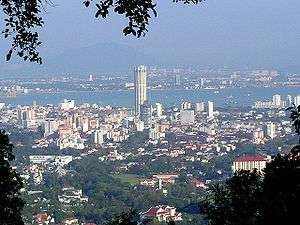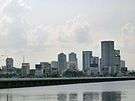List of cities in Malaysia
This is a list of cities of Malaysia. In Malaysia, there are populated areas which are granted city status by law (bandar raya). However, there are also highly urbanised and populated areas which does not have city status, but are sometimes colloquially also referred to as cities. City status is granted to a place within a local government area. Other populated areas which does not have city status are legally categorised as a municipality or town.
Cities of Malaysia
The following is a list of places in Malaysia in order by the date they were granted city status.
| Name | State/FT | Local government(s) | Chartered | Population (2010 Census) | Ref. |
|---|---|---|---|---|---|
| George Town Penang Island | Penang | Penang Island City Council | 1 January 1957 1 January 2015 | 708,127 | renewed city status as Penang Island |
| Kuala Lumpur | Kuala Lumpur | Kuala Lumpur City Hall | 1 February 1972 | 1,588,750 | |
| Ipoh | Perak | Ipoh City Council | 27 May 1988 | 657,892 | |
| Kuching | Sarawak | Kuching North City Hall Kuching South City Council | 1 August 1988 | 325,132 | Kuching is officially consist of two local government entities |
| Johor Bahru | Johor | Johor Bahru City Council | 1 January 1994 | 497,067 | |
| Kota Kinabalu | Sabah | Kota Kinabalu City Hall | 2 February 2000 | 452,058 | |
| Shah Alam | Selangor | Shah Alam City Council | 10 October 2000 | 641,306 | |
| Malacca City | Malacca | Historical Malacca City Council | 15 April 2003 | 484,885 | |
| Alor Setar | Kedah | Alor Setar City Council | 21 December 2003 | 405,523 | |
| Miri | Sarawak | Miri City Council | 20 May 2005 | 234,541 | |
| Petaling Jaya | Selangor | Petaling Jaya City Council | 20 June 2006 | 613,977 | |
| Kuala Terengganu | Terengganu | Kuala Terengganu City Council | 1 January 2008 | 337,553 |
- Former city within Malaysia
| Name | State | Local government | Chartered | Ref. |
|---|---|---|---|---|
| City of Singapore | Singapore | City Council of Singapore | 22 September 1951 | expelled from the Federation on 9 August 1965 |
Penang
George Town became a city on 1 January 1957 by a royal charter granted by Her Majesty Queen Elizabeth II, becoming the first town in the Federation of Malaya to become a city (Singapore became a city in 1951). The royal charter stated that :
"... the said Municipality of George Town shall on the First Day of January in the year of Our Lord One thousand nine hundred and fifty seven and forever thereafter be a city and shall be called and styled the CITY OF GEORGE TOWN instead of the Municipality of George Town and shall thenceforth have all such rank, liberties, privileges and immunities as are incident to a City."
However, local government elections were abolished by the federal government in 1965, and the functions of the City Council were transferred to the Chief Minister of Penang in 1966. A Municipal Council for the whole of Penang island was set up between 1974 and 1976.
Although the city status of George Town was never officially revoked, George Town's existence as a corporate entity was in doubt, let alone as a city. This is similar to the position of the former city of Rochester in England, the site of England's second-oldest cathedral, which had been a city from 1211 until 1998, when it was merged with a neighbouring borough. As the new council was not granted city status, and the city through oversight failed to appoint charter trustees to inherit the city charter, the city ceased to exist.
This view was disagreed with by most local residents, who held that as George Town's city status has never been revoked, it remains a city to this day. According to lawyer, Datuk Anwar Fazal, George Town "legally has been and is still a city because the City of George Town Ordinance 1957 had not been repealed".[3] As city status is a matter of law, the actual legal position will depend on an analysis of the City Council of Penang (Transfer of Functions) Order 1966 and the Local Government Act 1976.
On 1 January 2015, Penang island, on which George Town is located, was awarded city status by the Malaysian government.[1] Thus, George Town is the only city in Malaysia to have been conferred city status twice.
Subsequent cities
Kuala Lumpur, Kuching, Kota Kinabalu, Shah Alam, Malacca City, Alor Setar and Miri's royal charters were from the Yang di-Pertuan Agong, while Ipoh and Johor Bahru were granted by their respective state sultans. Malacca was declared a "historical city" prior to being granted city status in 2003.
Kuala Lumpur, the largest city, is the federal capital and a federal territory, but as of 2003, most government executive bodies are moving to the new administrative capital and federal territory of Putrajaya.
Criteria
Among the latest (2008) basic criteria for granting City status on a local government is that it has a minimum population of 500,000 and an annual income of not less than RM 100 million.[2]
Population
Kuala Lumpur is by far the largest urban area as well as the largest metropolitan area in Malaysia. Penang Island, which includes George Town, is the second largest city in Malaysia as well as having the second largest conurbation in Malaysia, while Johor Bahru is the third largest metropolitan in Malaysia. Other major cities with a population of more than 500,000 include Ipoh, Kajang, Kuching, and Kota Kinabalu. The following table shows the largest populated area within a local government area.
| Largest cities of Malaysia (2010)[3] | ||||||||||
|---|---|---|---|---|---|---|---|---|---|---|
| Rank | City | State | Population | |||||||
| 1 | Kuala Lumpur | 1,475,337 | ||||||||
| 2 | George Town, Penang | 708,127 | ||||||||
| 3 | Ipoh | 657,892 | ||||||||
| 4 | Shah Alam | 641,306 | ||||||||
| 5 | Petaling Jaya | 613,977 | ||||||||
| 6 | Johor Bahru | 497,067 | ||||||||
| 7 | Malacca | 484,885 | ||||||||
| 8 | Kota Kinabalu | 452,058 | ||||||||
| 9 | Alor Setar | 405,523 | ||||||||
| 10 | Kuala Terengganu | 337,553 | ||||||||
See also
- Districts of Malaysia
- List of capitals in Malaysia
- List of cities and towns in Malaysia by population
- List of local governments in Malaysia
- List of cities in Malaysia with large Malaysian Chinese populations
References
- ↑ Looi Sue-Chern (24 March 2015). "George Town a city again". The Malaysian Insider. Retrieved 10 July 2015.
- ↑ "Criteria Status for Local Authority". Local Government Department. 30 June 2011. Archived from the original on 15 July 2015. Retrieved 24 April 2012.
- ↑ "List of cities, Malaysia (2010)" (PDF). Department of Statistics, Malaysia. p. 17. Archived from the original (PDF) on 6 October 2014. Retrieved 28 November 2013.
External links
- Map at Archive.is (archived 2013-01-05)
- Population of cities in Malaysia from World Gazetteer at Archive.is (archived 2012-12-09)



